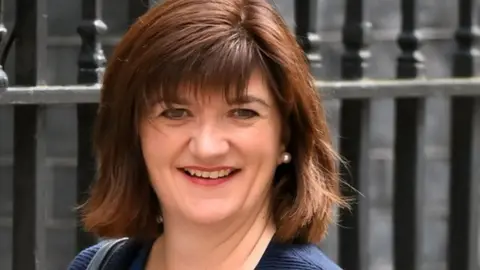Education Secretary calls for tuition fee 'variety'
 Alamy
AlamyMore "variety" is needed in the price of university education, the secretary of state said ahead of a government review of the system.
Damian Hinds also suggested tuition fees should reflect each degree's value "to our society as a whole".
It comes as a committee of MPs said there was no justification for such "high interest rates" on student loans.
Labour said another review would not solve the problems posed by interest rate increases and fee rises.
The review, to be launched by Prime Minister Theresa May on Monday, will consider cutting or freezing £9,250 tuition fees and lowering interest rates to reduce levels of graduate debt.
There will also be discussion of funding for vocational courses and apprenticeships to tackle skills shortages.
Appearing on the BBC's Andrew Marr Show, Mr Hinds would not go into specifics about the review, which he said would be carried out by an independent panel.
 JEFF OVERS/BBC
JEFF OVERS/BBCHe defended the current system - under which students begin to repay fees when they earn over £21,000, rising to £25,000.
But he said that when it was devised, ministers had not expected so many courses to be charging the same fee.
"What we need to look at is the different aspects of pricing - the cost that it is to put on the course, the value that it is to the student and also the value to our society as a whole and to our economy for the future," he said.
He said politicians would not be setting the price of different courses, but added: "What we are doing in the review is looking at how that system works, making sure there are alternatives, making sure there is more variety."
This could include cheaper ways of delivering university education like shorter courses and part-time study, he said.
Mr Hinds' predecessor as education secretary, Conservative MP Justine Greening, said student finance should not be a "political football" and warned against the issue being "kicked into the long grass" with a review.
She predicted the review would face a "challenge" in trying to work out which degrees were most beneficial to the country.
Labour's education spokeswoman Angela Rayner said the government had announced three reviews of tuition fees in 12 months and that another one would not "solve the problem of the hike in interest rates which this government has done and the tripling of tuition fees".

Analysis - what will ministers do about fees?
BBC education correspondent Sean Coughlan
This might have been heralded as taking an axe to tuition fees, but in practice it sounds more like prudent pruning.
Damian Hinds has signalled that university fees and student debts in England are much higher than anyone really expected when the current system was introduced in 2012.
The forthcoming review will look for ways to push down the cost - such as lowering interest rates, restoring maintenance grants or reducing fees for some courses.
The most definite impact for students is that tuition fees are not going above £9,250 any time soon, and the freeze on fees could continue indefinitely.
But there is no sign of any radical cutting of the headline figure for fees or pressure for a fundamentally different system.
And Mr Hinds seemed to play down suggestions of any intervention from ministers to set different fee levels for sciences, arts and humanities.
On schools, Mr Hinds has positioned himself as a pragmatic traditionalist.
He's supportive of grammar schools - but there are no plans for any new grammars to be opened.
And he will revive the prime minister's stalled plan to allow more free schools to be set up by faith groups.

According to the Treasury select committee, the review should reconsider the level of interest rates and whether these charges should be applied when students are still studying.
The Institute for Fiscal Studies has shown that students in England will run up more than £5,000 in interest charges before they have even left university.
Former Conservative and Labour education ministers Ms Greening, Lord Willetts, Lord Adonis and Charles Clarke have all raised concerns about the level of interest charges.
 PA
PAThere is also a call to consider reinstating maintenance grants for disadvantaged students, after these were abolished last year.
Committee chairwoman Nicky Morgan, a former education secretary, warned that the maintenance loans available to students were not enough to cover all their living costs.
"If a student can't access additional sources of income, they may be priced out of university," said the committee chairman.
The MPs are also asking for a clearer explanation of why such a high level of tuition fee is necessary.
The review of fees, first promised in the autumn by the prime minister, will examine whether students are paying a fair amount, whether it is the most efficient way of funding universities and whether students are getting value for money when they are graduating with an average of £50,000 in debt.
It will also consider the funding of the broader post-18 education system and whether students not on three-year degree courses are getting enough support.
Part-time student numbers fell sharply after the last fees increase - and the Treasury Select Committee has called on the review to find ways to reverse this.
Peter Horrocks, vice-chancellor of the Open University, said the committee of MPs "rightly recognised that part-time students have been the real victims of the 2012 reforms".
"The collapse in part-time student numbers in England is undermining attempts to tackle the skills crisis in the economy," said Mr Horrocks.
